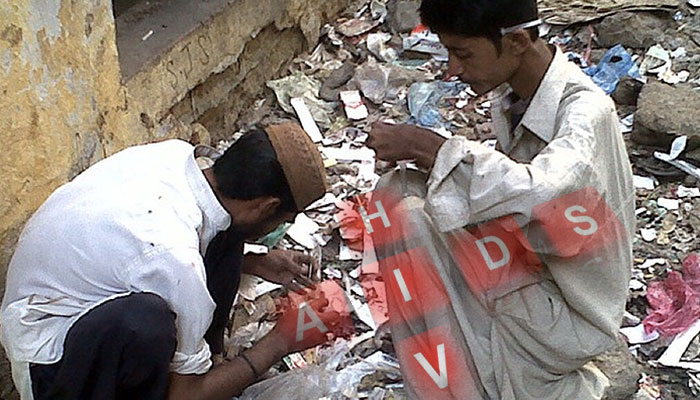Only one AIDS prevention and diagnosis center for Pakistan's largest city
Dismal state shows lack of seriousness of authorities, UNAIDS expresses concern over HIV prevalence in the metropolis
May 25, 2017

In a recent meeting with legislators in Sindh, Dr Mamadou Sakho, Country Director, UNAIDS Pakistan and Afghanistan had advised working diligently to contain the disease adding that the global community was there to support Pakistan technically and financially.
Pakistan should chip in all resources available to contain HIV.
"Since Karachi is among the top cities of the world where HIV's prevalence is high, it is time to work more efficiently among such communities in this city, including raising awareness among all stakeholders to keep the disease in check,"
He added that it was the need of the hour to work with communities, which were vulnerable to the disease.
Men and women working as sex workers, injecting drug users (IDUs), members of the transgender community and those serving time in prisons, were defined as the 'most at risk' populations.
Dr Mamadou warned, that Pakistan could face an Africa-like situation in the next three to five years with respect to HIV/AIDS.
"At present, Pakistan is among the countries where specific communities are exposed to HIV, warranting us to work among them and contain the disease. If it is not done and the disease gets generalised, like it is in the countries of Africa, it will become too difficult to rein it in."
“This is a very alarming situation because at the moment HIV/AIDS is confined to a concentrated group of people, including IDUs and the transgender community, in Pakistan,” Dr Mamadou added.
HIV/AIDS prevalence among IDUs has jumped to 48 per cent in Karachi during the past five years, which meant that of the 100 IDUs, 48 were infected with HIV/AIDS and had the potential to pass on the deadly infection to others.
Quoting the provisional results of the fifth round of the Integrated Behavioural & Biological Surveillance (IBBS), which concluded last month, He said HIV/AIDS prevalence among IDUs was 38 per cent in entire Pakistan and 21.9 percent in Sindh, but in Karachi, it was increasing and had reached up to 48 per cent.
“This is a very alarming situation because at the moment HIV/AIDS is confined to a concentrated group of people, including IDUs and the transgender community, in Pakistan,”
According to the spokesman of the Sindh Aids Control program, there is only one treatment center in Karachi which is in Civil Hospital Karachi
Senior Director Health services of in Karachi Metropolitan Cooperation Dr Muhammad Ali Abbasi more than 250 health facilities are working in entire Karachi but unfortunately, not a single clinic of HIVAIDS has been established from Sindh Aids Control Program
On the other hand sources further said that prisoners in jails across Sindh have not been screened in the last two years.
According to Dr Nadeem Shiekh Additional Director of Health Karachi HIV/AIDS is an enormous development issue and a potential security crisis. It poses a serious threat to achievements so far gained in reducing poverty and is, therefore, an obstacle to the realisation of national goals.
With an estimated prevalence rate of less than 0.1%, Pakistan continues to have a low-level HIV epidemic among the general population however, serial surveillance results indicate that concentrated epidemics have already established among key populations (KPs).
HIV Surveillance data has been used extensively to guide HIV prevention program in Pakistan. Owing to the information gathered through surveillance, the overall preventive response shifted its focus from screening and general education campaigns to HIV preventive services delivered through NGOs for key populations (KPs) particularly PWIDs
The results of this SGS round will provide new insights to the HIV epidemic in Pakistan and will be used extensively to further shape the prevention programs in Pakistan.
In the past few years, the HIV prevention response in Pakistan has undergone rapid transformations. Between the surveillance round conducted in 2010-11 and this current round of surveillance (2016-17), there has been a massive amendment of the HIV response. The decision to devolve the Ministry of Health, including various Public Health programs including the National AIDS Control Program has resulted in an indentation of the National HIV response in the country and has adversely effected the HIV response. Lack of National coordination, data analyses and utilization at a National level, nonavailability of National guidance and monitoring show a strong negative impact on the results of this surveillance round.











